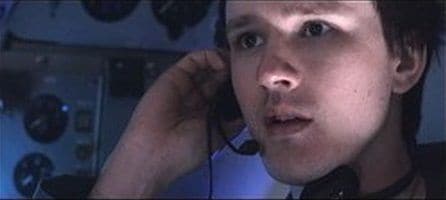Eye For Film >> Movies >> Somnus (2016) Film Review
Somnus
Reviewed by: Jennie Kermode

The digital revolution in filmmaking has opened up the opportunity for independent teams working on small budgets to venture into territory they could never have navigated before. It's one of those technological leaps, like the expansion into space that forms the background to this film, which throws into sharp relief the limitations of humanity's collective imagination. Does art really flourish within restraints or is it simply that restraints provide cover for weaknesses? The more freedom we have, the harder we have to work to justify the use of it.
Somnus takes advantage of new technology to offer us glittering starfields every bit as alluring as those in 2001, which it desperately wants to be. This is supported by some high quality traditional work, with well designed spaceship interiors and effective use of models. Unfortunately it's a lot less sure what to do with its setting. Instead of going back to the basics of story construction where it might have found solutions, it runs the gamut of similarly themed science fiction films, loosely reassembling fragments as if a narrative will magically fall out. the inclusion of assorted sea creatures recalls Werner Herzog's The Wild Blue Yonder, which did something similar, but needless to say, this is rather less successful.

The story, such as it is, follows the crew of a small cargo ship - one of them, ominously, on his last run - who find themselves in trouble when the ship's computer reveals that it has its own ideas about the nature of their mission. Though it might be mistaken for the lovechild of HAL 200 and Alien's Mother, this computer has a more complex origin - hinted at in the prologue - which, though it perhaps owes a little to Interstellar, provides the closest thing here to an original plotline and deserves more room to develop than it gets. Providing the voice, Meryl Griffiths strikes a deft balance between something Microsoft or Apple might think sounded helpful and something you won't want to punch after ten minutes. there's perhaps a little of Moon's Gerty in there too, though without that level of poignancy.
Forced to divert to a neglected asteroid colony in order to pick up supplies vital to life support, the crew find something there which shocks them but which will come as no surprise to fans of Seventies BBC science fiction television series. There's an almost surreal charm to some of these scenes, which are very differently played from what has gone before, so that despite the slow first half the film comes close to recovery, but the cod philosophy of the ending leaves it in a mess that even a hasty retreat into Quiet Earth territory can't redeem.
Is there potential here? Definitely. This is one of those films one keeps hoping for because it's clear that a great deal of effort has been expended on it. The central performances are all competent, even if they never quite compel in the way they need to. The direction isn't bad. The problem is that the film has no clear idea of its identity or course. In cinema, as in space, that can be fatal.
Reviewed on: 10 Sep 2016















